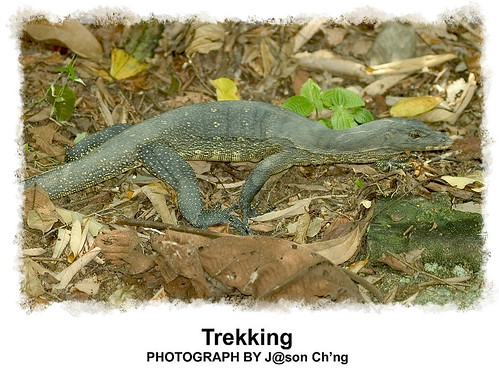Trekking
trek
intr.v. trekked, trek·king, treks
To make a slow or arduous journey.
To journey on foot, especially to hike through mountainous areas.
South African. To travel by ox wagon.
n.
A journey or leg of a journey, especially when slow or difficult.
South African. A journey by ox wagon, especially a migration such as that of the Boers from 1835 to 1837.
trekker n.
Word History: Though now most familiar to English-speakers and others in the title of the Star Trek television shows and movies, the word trek originally referred to a journey by a much slower mode of transportation than a starship. Trek was borrowed into English in South Africa, where the word was used by the Boers for a journey by ox wagon. A seminal event in the history of South Africa was the “Groot Trek” from 1835-1843, in which more than 10,000 Boers, the Voortrekkers, left the Cape Colony and traveled north and northeast because of economic problems, conflict with the Xhosa, and discontent with British colonial authorities, who had forbidden the slave trade and postulated the equality of whites and non-whites. The British, who seized control of South Africa from the Boers at the turn of the 20th century, seized the word trek during the 19th. Trek is recorded earliest in 1822 in the compound trektow, “a rope joining the wagon pole and the yoke to which oxen were fastened.” Trek in this compound is either the noun or the stem of the corresponding verb in Afrikaans, trekken. The earliest recorded use of the noun by itself is found in 1849, where it means “a stage in a journey by ox wagon.”

intr.v. trekked, trek·king, treks
To make a slow or arduous journey.
To journey on foot, especially to hike through mountainous areas.
South African. To travel by ox wagon.
n.
A journey or leg of a journey, especially when slow or difficult.
South African. A journey by ox wagon, especially a migration such as that of the Boers from 1835 to 1837.
trekker n.
Word History: Though now most familiar to English-speakers and others in the title of the Star Trek television shows and movies, the word trek originally referred to a journey by a much slower mode of transportation than a starship. Trek was borrowed into English in South Africa, where the word was used by the Boers for a journey by ox wagon. A seminal event in the history of South Africa was the “Groot Trek” from 1835-1843, in which more than 10,000 Boers, the Voortrekkers, left the Cape Colony and traveled north and northeast because of economic problems, conflict with the Xhosa, and discontent with British colonial authorities, who had forbidden the slave trade and postulated the equality of whites and non-whites. The British, who seized control of South Africa from the Boers at the turn of the 20th century, seized the word trek during the 19th. Trek is recorded earliest in 1822 in the compound trektow, “a rope joining the wagon pole and the yoke to which oxen were fastened.” Trek in this compound is either the noun or the stem of the corresponding verb in Afrikaans, trekken. The earliest recorded use of the noun by itself is found in 1849, where it means “a stage in a journey by ox wagon.”

0 Comments:
Post a Comment
<< Home